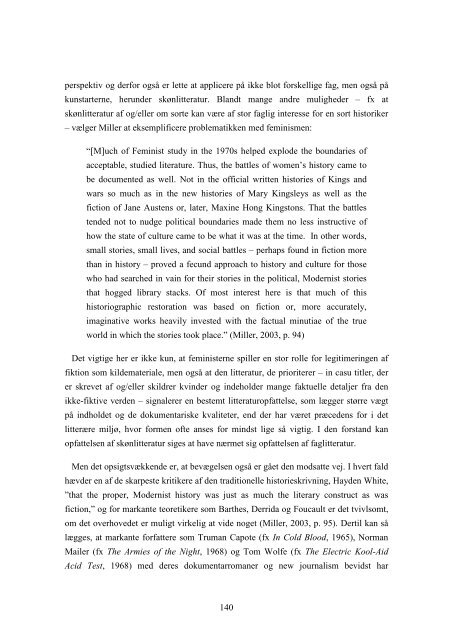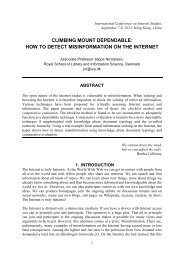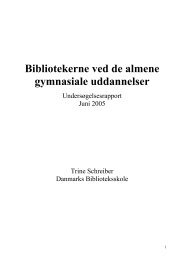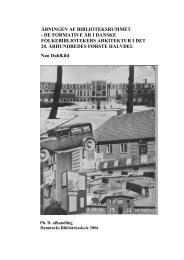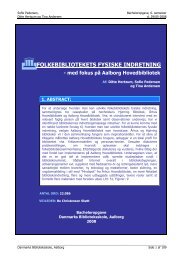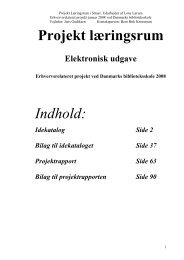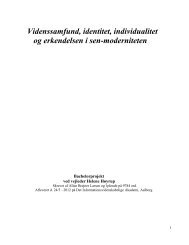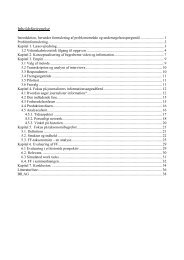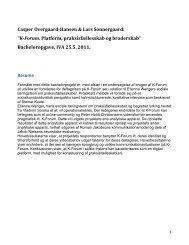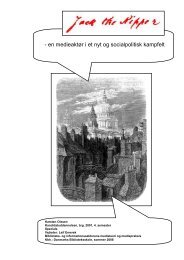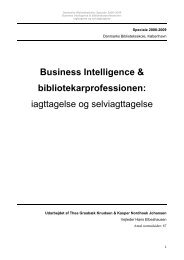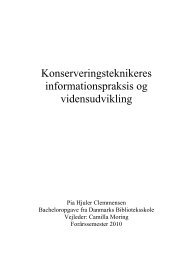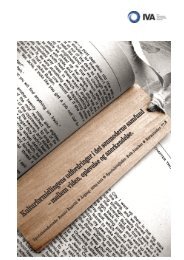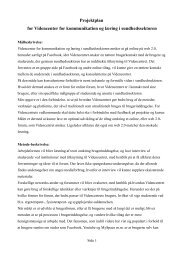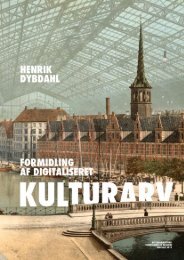Template for PhD Dissertation - Forskning
Template for PhD Dissertation - Forskning
Template for PhD Dissertation - Forskning
You also want an ePaper? Increase the reach of your titles
YUMPU automatically turns print PDFs into web optimized ePapers that Google loves.
perspektiv og der<strong>for</strong> også er lette at applicere på ikke blot <strong>for</strong>skellige fag, men også på<br />
kunstarterne, herunder skønlitteratur. Blandt mange andre muligheder – fx at<br />
skønlitteratur af og/eller om sorte kan være af stor faglig interesse <strong>for</strong> en sort historiker<br />
– vælger Miller at eksemplificere problematikken med feminismen:<br />
“[M]uch of Feminist study in the 1970s helped explode the boundaries of<br />
acceptable, studied literature. Thus, the battles of women’s history came to<br />
be documented as well. Not in the official written histories of Kings and<br />
wars so much as in the new histories of Mary Kingsleys as well as the<br />
fiction of Jane Austens or, later, Maxine Hong Kingstons. That the battles<br />
tended not to nudge political boundaries made them no less instructive of<br />
how the state of culture came to be what it was at the time. In other words,<br />
small stories, small lives, and social battles – perhaps found in fiction more<br />
than in history – proved a fecund approach to history and culture <strong>for</strong> those<br />
who had searched in vain <strong>for</strong> their stories in the political, Modernist stories<br />
that hogged library stacks. Of most interest here is that much of this<br />
historiographic restoration was based on fiction or, more accurately,<br />
imaginative works heavily invested with the factual minutiae of the true<br />
world in which the stories took place.” (Miller, 2003, p. 94)<br />
Det vigtige her er ikke kun, at feministerne spiller en stor rolle <strong>for</strong> legitimeringen af<br />
fiktion som kildemateriale, men også at den litteratur, de prioriterer – in casu titler, der<br />
er skrevet af og/eller skildrer kvinder og indeholder mange faktuelle detaljer fra den<br />
ikke-fiktive verden – signalerer en bestemt litteraturopfattelse, som lægger større vægt<br />
på indholdet og de dokumentariske kvaliteter, end der har været præcedens <strong>for</strong> i det<br />
litterære miljø, hvor <strong>for</strong>men ofte anses <strong>for</strong> mindst lige så vigtig. I den <strong>for</strong>stand kan<br />
opfattelsen af skønlitteratur siges at have nærmet sig opfattelsen af faglitteratur.<br />
Men det opsigtsvækkende er, at bevægelsen også er gået den modsatte vej. I hvert fald<br />
hævder en af de skarpeste kritikere af den traditionelle historieskrivning, Hayden White,<br />
”that the proper, Modernist history was just as much the literary construct as was<br />
fiction,” og <strong>for</strong> markante teoretikere som Barthes, Derrida og Foucault er det tvivlsomt,<br />
om det overhovedet er muligt virkelig at vide noget (Miller, 2003, p. 95). Dertil kan så<br />
lægges, at markante <strong>for</strong>fattere som Truman Capote (fx In Cold Blood, 1965), Norman<br />
Mailer (fx The Armies of the Night, 1968) og Tom Wolfe (fx The Electric Kool-Aid<br />
Acid Test, 1968) med deres dokumentarromaner og new journalism bevidst har<br />
140


